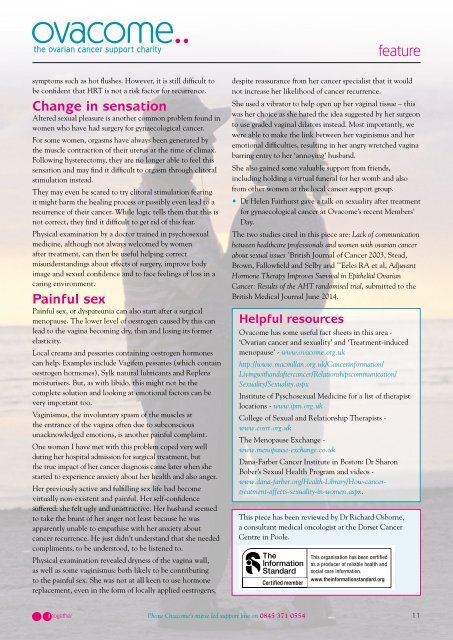Ovacome Summer 2014
Ovacome Summer 2014
Ovacome Summer 2014
You also want an ePaper? Increase the reach of your titles
YUMPU automatically turns print PDFs into web optimized ePapers that Google loves.
feature<br />
symptoms such as hot flushes. However, it is still difficult to<br />
be confident that HRT is not a risk factor for recurrence.<br />
Change in sensation<br />
Altered sexual pleasure is another common problem found in<br />
women who have had surgery for gynaecological cancer.<br />
For some women, orgasms have always been generated by<br />
the muscle contraction of their uterus at the time of climax.<br />
Following hysterectomy, they are no longer able to feel this<br />
sensation and may find it difficult to orgasm through clitoral<br />
stimulation instead.<br />
They may even be scared to try clitoral stimulation fearing<br />
it might harm the healing process or possibly even lead to a<br />
recurrence of their cancer. While logic tells them that this is<br />
not correct, they find it difficult to get rid of this fear.<br />
Physical examination by a doctor trained in psychosexual<br />
medicine, although not always welcomed by women<br />
after treatment, can then be useful helping correct<br />
misunderstandings about effects of surgery, improve body<br />
image and sexual confidence and to face feelings of loss in a<br />
caring environment.<br />
Painful sex<br />
Painful sex, or dyspareunia can also start after a surgical<br />
menopause. The lower level of oestrogen caused by this can<br />
lead to the vagina becoming dry, thin and losing its former<br />
elasticity.<br />
Local creams and pessaries containing oestrogen hormones<br />
can help. Examples include Vagifem pessaries (which contain<br />
oestrogen hormones), Sylk natural lubricants and Replens<br />
moisturisers. But, as with libido, this might not be the<br />
complete solution and looking at emotional factors can be<br />
very important too.<br />
Vaginismus, the involuntary spasm of the muscles at<br />
the entrance of the vagina often due to subconscious<br />
unacknowledged emotions, is another painful complaint.<br />
One woman I have met with this problem coped very well<br />
during her hospital admission for surgical treatment, but<br />
the true impact of her cancer diagnosis came later when she<br />
started to experience anxiety about her health and also anger.<br />
Her previously active and fulfilling sex life had become<br />
virtually non-existent and painful. Her self-confidence<br />
suffered: she felt ugly and unattractive. Her husband seemed<br />
to take the brunt of her anger not least because he was<br />
apparently unable to empathise with her anxiety about<br />
cancer recurrence. He just didn’t understand that she needed<br />
compliments, to be understood, to be listened to.<br />
Physical examination revealed dryness of the vagina wall,<br />
as well as some vaginismus: both likely to be contributing<br />
to the painful sex. She was not at all keen to use hormone<br />
replacement, even in the form of locally applied oestrogens,<br />
despite reassurance from her cancer specialist that it would<br />
not increase her likelihood of cancer recurrence.<br />
She used a vibrator to help open up her vaginal tissue – this<br />
was her choice as she hated the idea suggested by her surgeon<br />
to use graded vaginal dilators instead. Most importantly, we<br />
were able to make the link between her vaginismus and her<br />
emotional difficulties, resulting in her angry wretched vagina<br />
barring entry to her ‘annoying’ husband.<br />
She also gained some valuable support from friends,<br />
including holding a virtual funeral for her womb and also<br />
from other women at the local cancer support group.<br />
• Dr Helen Fairhurst gave a talk on sexuality after treatment<br />
for gynaecological cancer at <strong>Ovacome</strong>’s recent Members’<br />
Day.<br />
The two studies cited in this piece are: Lack of communication<br />
between healthcare professionals and women with ovarian cancer<br />
about sexual issues * British Journal of Cancer 2003, Stead,<br />
Brown, Fallowfield and Selby and ** Eeles RA et al, Adjuvant<br />
Hormone Therapy Improves Survival in Epithelial Ovarian<br />
Cancer: Results of the AHT randomised trial, submitted to the<br />
British Medical Journal June <strong>2014</strong>.<br />
Helpful resources<br />
<strong>Ovacome</strong> has some useful fact sheets in this area -<br />
‘Ovarian cancer and sexuality’ and ‘Treatment-induced<br />
menopause’ - www.ovacome.org.uk<br />
http://www.macmillan.org.uk/Cancerinformation/<br />
Livingwithandaftercancer/Relationshipscommunication/<br />
Sexuality/Sexuality.aspx<br />
Institute of Pyschosexual Medicine for a list of therapist<br />
locations - www.ipm.org.uk<br />
College of Sexual and Relationship Therapists -<br />
www.cosrt.org.uk<br />
The Menopause Exchange -<br />
www.menopause-exchange.co.uk<br />
Dana-Farber Cancer Institute in Boston: Dr Sharon<br />
Bober’s Sexual Health Program and videos -<br />
www.dana-farber.org/Health-Library/How-cancertreatment-affects-sexuality-in-women.aspx.<br />
This piece has been reviewed by Dr Richard Osborne,<br />
a consultant medical oncologist at the Dorset Cancer<br />
Centre in Poole.<br />
it together<br />
Phone <strong>Ovacome</strong>’s nurse led support line on 0845 371 0554 11



